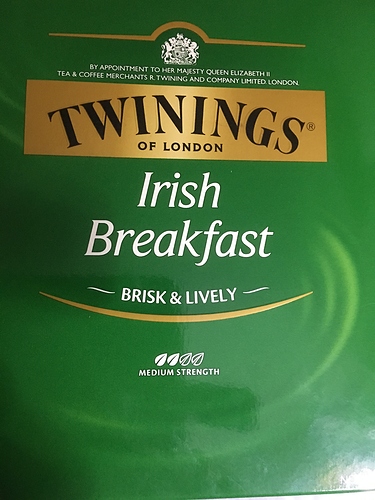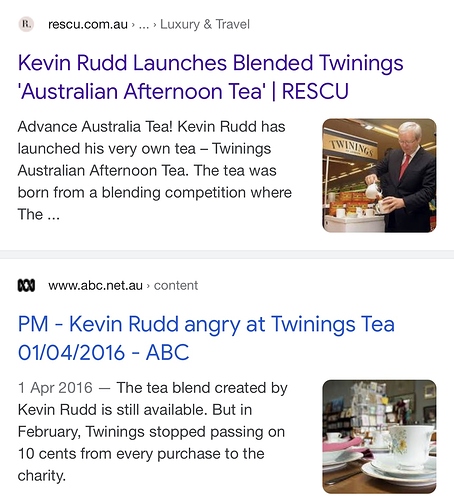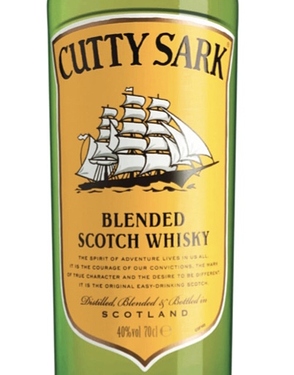I’m sorry but I need to disagree with your point. The quote from the box you have provided only appears to state the blend, with whom and for whom it’s created. I cannot see this as misleading. IMHO.
The name ‘Australian Afternoon’ was given after Kevin Rudd, when Foreign Affairs Minister won the Twinings Australian Afternoon Tea Challenge in 2011.
Some might say this was his greatest victory.
Twinings had 63 celebrities creating a quintessential Australian afternoon tea blend with 85,000 public votes selecting the final brew. It was launched on Australia Day 2012 and was going to have a limited run. More details at https://www.news.com.au/breaking-news/kevin-rudd-wins-twinings-tea-challenge/news-story/e0adcdaf630889f0e2d3cea85f1c38e9
Whenever I buy tea, I always look past the name to see where it was grown. However, in the circumtances of this labelling it seems to me the “Australianness” of this tea is very heavily promoted, if not indicating authenticity, perhaps to the point of suggesting no need to look for a grower.
In addition, one reason I look for the country of origin is that cheap and/or over-blended with chemical additives-type tea tends to lack country of origin. Hence no sale. Did Twinings realise that discerning tea consumers may look at their product this way??
What chemical additives are found in tea that you avoid?
Hehe. So some of the readers here must have thought Irish Breakfast was made in Ireland! And Russian Caravan made in Russia!  All Twinning teas are blends made by the company, not places of origins!
All Twinning teas are blends made by the company, not places of origins!
Glad you asked. In foodstuffs, it has been my experience that the dividing line between “natural” and artificial" varies from country to country, perhaps to the degree that an Australian would find unacceptable. The term “flavinoids” comes to mind, which can be either, but if a grower thinks they have produced a really good tea, why would they want to add flavours (unless to achieve a very specific blending they can’t do otherwise) ?
A better answer to your question may be “extracts”. I’m told that among “wellness teas”, Green Tea is highly regarded and totally natural. However, “Green Tea Extract” has been linked to liver failure and other health problems - source: Charlotte Hilton Andersen, When Green Tea Is a Bad Thing, Shape , June 23, 2014. (I don’t know if peer-reviewed)
In short, less than healthy teas may surface in non-conventional supermarkets/grocery shops. This tea production has been aimed at folk from other countries where consumer support is less accessible. Having said that human health varies - in some places the locals can drink the water but all I’d get is upset innards. Please excuse my vagary, I don’t want to cause any discrimination offence.
Welcome to the community @Simon1985
Two more blends I’d forgotten about and typical of many of the teas on the supermarket shelf.
Welcome to the community @markmux
It’s not tea!
Isn’t this a health food supplement for which FSANZ and the TGA have responsibilities?
EFSA (European Food Safety authority) has advised excessive consumption of the extract can have adverse health effects.
Drinking tea, including green tea is considered a healthy choice. All things in moderation.
P.S.
Doctors may recommend those taking certain medications avoid green tea.
I don’t know if it is discriminatory but your vagary is not helping to support your line
“I look for the country of origin is that cheap and/or over-blended with chemical additives-type tea tends to lack country of origin.”
If you can’t say what teas have these additives nor what the additives are you are not giving us much to go on. My usual response would be to look at Food Standards Australia and NZ to see if such additives are permitted and if they are likely to be harmful. That cannot happen unless you give details.
Neither bringing up the rather pointless distinction between ‘natural’ and ‘artificial’, nor introducing problems with tea extracts in capsules (when we are talking about leaf tea) help to support your claim.
My memory lapsed. Probably not quite on topic though.
Unlike tea, country of origin self evident. Aside from one obvious ingredient, we don’t spend days rummaging around wondering what else might be in the whisky as bottled.
Should we spend anymore time worrying about a good cup of tea. Choose a blend that you like from a brand you approve of and add the water of your choosing. Milk and sugar optional. The most important ingredient is the water. Reputedly you can’t make a great cuppa with poor quality water. The water is likely more critical than the tea. The same is said of great whisky.
For those who don’t like how Twinings label their tea there seems little point in changing it. There is freedom to choose any one of the alternate brands and blends that meets said higher standards.
The same might be said of Whiskey.![]()
Strictly speaking they aren’t so much an added flavour but are a natural constituent of the plant. Many promote that their tea has flavonoids because of the perceived (or possible real) health benefits. Some teas may very well contain naturally larger amounts due to the variety of tea leaf. Tea contains several types and further down in the article I have linked to you can see that Tea is well represented in a few areas.
I stopped purchasing Twining tea products a few years ago for that very reason of origin ambiguity. Also the Twinings English Breakfast leaf tea sold here in Australia was not of the same quality as sold in England. More like the sweepings off the floor in my view.
If you like quality strong, Indian tea, produced and packed in India, go to one of the amazing Indian grocery shops found in many suburbs. There are a few brands available, and are streets ahead of the fancy names and packaging found in the major supermarkets. They are also a fraction of the price.
Ray
Sundowner
I buy Nerada Tea. Without actually checking the packet (thrown out), I believe it is grown and processed in Australia. I shall check.
It is grown right here in FNQ.
Only their black teas (loose and bag). Any special Nerada teas such as English breakfast, Earl Grey etc aren’t Australian leaf. See the link in one of my previous posts (third post from the top).
Though this conversation started in January and finished in February this year, I have just read all the messages with great interest as I am an avid tea drinker.
Having recently purchased a box of TWININGS Cranberry & Pomegranate tea, I was disappointed upon reading the fine print at home that despite the enormous lettering on the box, it did not contain any actual or natural cranberry or pomegranate in it. BUT, in much smaller print on the bottom left hand corner and smaller still print on the back of the box, both against the darkish red background, it did say “FLAVOURED FRUIT INFUSION”.
So i wrote to TWININGS to ask them if there was actually none of those fruits in it, and if not what chemical was used to provide similar flavours. No response was received. And as with other comments, no countries of origin were otherwise given and it was “Blended and Packed in Poland to the highest standards by …”.
For Australian tea grower companies, I understand that we should not assume that all their products are Australian produced.
So simply a case of caveat emptor.


